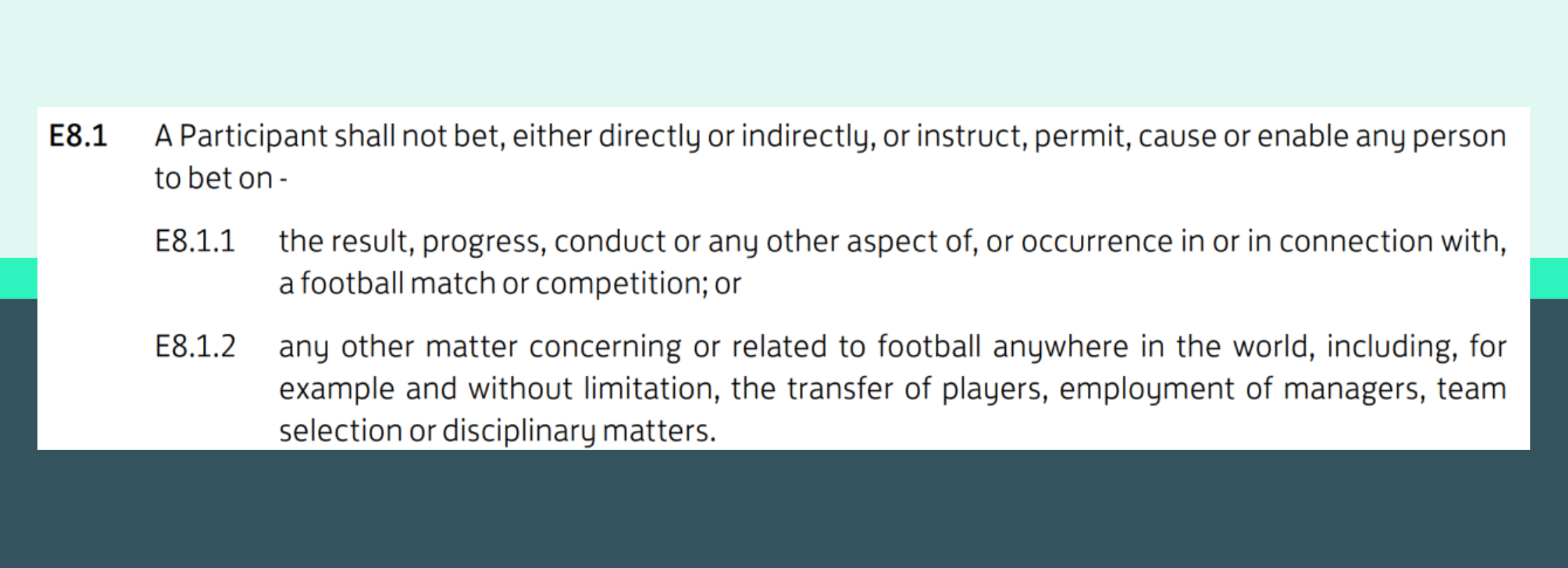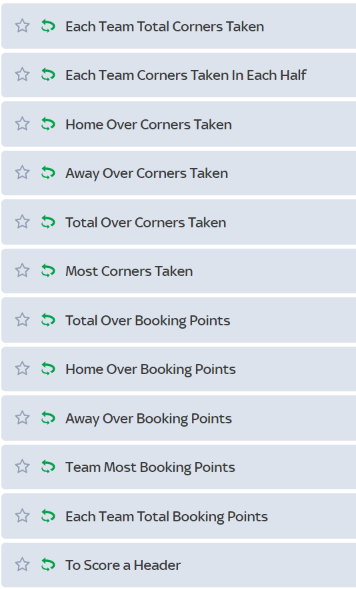Why Are Footballers Not Allowed To Bet?
It goes without saying that all sports should be played with integrity, fairness and honesty.
Football is the biggest sport in the world with an estimated 4 billion fans globally.
Not only is there huge emotional investment from fans worldwide, there is also gigantic financial investment. In fact, the global market of football is estimated to be worth $600 billion.
With so much at stake, every goal, every save, and every result matters. Sometimes, if you’re a passionate football fan like me, it matters way more than you want it to.
It’s imperative, therefore, to keep the sport as authentic and unbiased as possible. All action has to be without influence or ulterior motive. As much as it reasonably can be any way.
Football betting by those who can actively influence a match, is therefore prohibited to eliminate any element of doubt and protect the integrity of the sport.
So what is the rule, when was it put in place, why was it introduced, and what happens when footballers do bet on matches? Let’s take a look.
What Is The Rule On Footballers Making Bets?
Footballers are not allowed to place a bet on any football, anywhere in the world.
Whether a match or tournament is being played in the UK, or on the other side of the world, it makes no difference.
It is a worldwide ban. To be more precise, is it Rule E8 in the FA handbook.

It is not only applicable to match betting either, the ban also covers transfers of players, team selection, injuries or employment of football managers. Basically, if it is anything football related, all bets are off.
The rule is inclusive of direct bets placed by the footballer and also indirect bets placed by a third party (a relative or friend for example) or if they instruct another person to bet on their behalf.
Plus, if a player passes on ‘inside information’ to a third party through word of mouth, email, writing, or even social media postings and that person then goes on to place a bet, even without the footballer’s knowledge, the footballer will again be penalised.
Who Do Football Betting Rules Apply To?
It’s not just footballers themselves that are subject to the football betting ban. It also includes officials, managers, coaches, club staff, directors and licensed agents involved in all levels of the English game.
The restriction applies to anyone involved in the Premier League, English Football League, National League, The FA Women's Super League and The FA Women's Championship levels.
It also applies to clubs in the Northern, Southern and Isthmian leagues.
The exception to these rules are for participants at Step 5 or below in the National League system or for match officials operating below Level 4.
The worldwide football betting ban does not apply at these levels.
However, they are still unable to bet on football competitions or any other football related matter in the league or competitions they actively play in.
Since When Are Footballers Not Allowed To Bet?
The worldwide ban on football betting came into force from 1 August 2014 just ahead of the 2014/2015 season.
Before that, FA Rules only prohibited players betting on a match, competition, league or any football-related matter that they could influence or that they were involved in themselves.
The reason for the change to worldwide betting was no doubt due to the increased multicultural nature of football squads. Going back a couple of decades, you might find one or two international players in an average English football squad.
However, now teams are so diverse in terms of origin that international links and relationships are much easier to form so the potential to influence international matches is greater.
Why Was The Rule Introduced?
With football having such a global impact and interest, all eyes are on the sport as a beacon of good standards and quality.
The mere suggestion that someone could actively cheat or try to fix a football game undermines the whole ethos of the sport.
It was therefore deemed necessary to put something in place to ensure that players and officials remain as neutral and professional as possible without any external influences.
The key three danger areas are:
Match-fixing
Many sports are dogged by accusations of match fixing and football is no exception. In fact, the first record of match-fixing in English football goes all the way back to 1898 in a 0-0 draw between Stoke and Burnley.
The teams knew that if the match ended in a draw, they would both get promoted so they colluded in making no effort. It was so obvious that the Athletic News reported "the teams could have done without goalkeepers, so anxious were the forwards not to score".
History has shown that players betting on football matches has led to match-fixing in the past. A 1915 match between Liverpool and Manchester United resulted in a suspiciously poor performance by Liverpool, who lost 2-0. It later emerged that players from both teams had placed bets on the exact score.
Further scandals in 1964, 2008 and 2013 resulted in further evidence of players influencing match results in order to win money at the bookies.
Bribes
Once again history shows that bribes have been evident in football for quite some time. Even as far back as 1899, Burnley's Jack Hillman offered Nottingham Forest players £2 each to "take it easy" in a match between the teams.
I’m not sure £2 would go very far these days, but back then it would have been a tempting prospect.
The main reason for bribes in the game is linked to football betting. The 1964 scandal involved ten professional footballers being jailed for throwing matches due to bribes and betting.
Meanwhile, more recently in 2013, five professional footballers were at the centre of a bribery scandal after admitting to organising cash payments of £30,000 to players for getting a yellow card and up to £70,000 for a red card.
Betting Markets
Football betting markets have grown significantly in recent years. Previously, the majority of football bets would be placed on match result or goal scorer markets.
It would therefore be much harder for individual players to ‘fix’ a match single-handedly or ensure a specific player scored. However, now there are a plethora of individual betting markets that would be easier for players to take advantage of.

A player could bet on themselves to get booked for example, or to commit a foul, or to make three or more tackles in the first half and then ensure they do that during the match.
The same goes for officials who could bet on a penalty being awarded or a player being sent off. These incidents are called ‘spot fixing’.
With greater betting markets comes greater temptation, so a blanket ban on all was deemed necessary.
What Happens When Footballers Bet?
Let’s face it, no one likes a cheat.
Footballers manipulating or engineering games, whether due to betting or bribes, is a smudge on the sport’s integrity and a slap in the face to the millions of fans who follow it.
That’s why the FA come down heavily on footballers who place bets by dishing out fines, suspensions and in some cases lifetime bans.
Of course, there are cases, some very recent, involving players still betting on football regardless of the ban. It must be made clear, however, that in lots of these cases there is no clear evidence of cheating, match fixing, or bribery.
England striker, Ivan Toney, who was part of England’s 2024 Euro squad, is a classic example of this. The Brentford forward received an eight-month ban from football after placing 232 football bets between 2017 - 2021, including some on his own team.
Toney admitted to having a gambling addiction and is rebuilding his career again after seeking support.
His England teammate Kieran Trippier, who plays for Newcastle United, also served a ten-week ban and £70,000 fine for telling a friend about his impending transfer to Atletico Madrid in 2019.
Meanwhile, another Newcastle player, Sandro Tonali is currently serving a ten-month ban from football for his involvement in illegal betting in October 2023. His original ban was for three years, but they reduced it due to him admitting his guilt.
They aren’t the only ones though. Joey Barton famously received a 18-month ban after placing 1,260 bets on football matches over a ten-year period. Former England striker Daniel Sturridge received a four-month ban and £120,000 fine for providing insider information to his brother and instructing him to place a bet on a potential transfer move.
Plus, current players Andros Townsend, Dan Gosling and Cameron Jerome are also among those to have been found to have breached current betting regulations.
What About Football Club Owners Who Run Betting Companies?
The FA knows that some English football clubs are owned by betting companies, so allowances have to be made.
The Coates family, who own Stoke City and Bet365, are one such example. Brighton and Hove Albion owner Tony Bloom is known as the ‘Godfather of Gambling’ and has made his fortune through playing poker and sports betting.
Meanwhile, Matthew Benham, owner of Brentford FC owns both a betting statistics company for professional gamblers as well as Matchbook betting exchange.
Although Rule E8 applies to owners as well as players, the FA were aware that they couldn’t enforce the same rules to owners without having an adverse impact on some clubs.
In an attempt to address the issue, an exemption was drawn up for “participants” in football, aimed at club owners.
The document is not available to the public, but supposedly ensures that those bound by the policy must submit an annual declaration.
They must also not have any direct involvement in the setting of odds, the determining of markets or the selection or placing of individual bets on football.
Can Footballers Place Any Bets At All?
As confirmed by the PFA, players in England can gamble on any non-football-related betting markets.
So, it is possible for them to bet on all other sports except football.
Footballers can also bet at the casino, with players such as Neymar publicly sharing his love of poker.
Meanwhile Mario Balotelli famously hit the headlines for winning a £25,000 jackpot at a Manchester casino and donating £1,000 of it to the first homeless person he encountered.
Conclusion
Footballers are not allowed to bet on football as it opens the door to corruption. Whether consciously, or subconsciously, players could let bets impact their actions on the pitch which would destroy the integrity of the game.
Having a blanket worldwide ban eliminates all confusion over what they can or can’t bet on. It’s a strict no-go policy on any football markets and that includes passing on inside information to others.
In order to ensure rules are abided by, the FA are making a point of handing out strong punishments to players. And, now, players are aware that should they break the rules, they can suffer severe consequences to their careers and reputation.
Updated: 24 Dec 2024
The Author
Lynsey has been writing in the iGaming and sports betting industry for almost a decade. She has three years of experience in Matched Betting and enjoys sharing her expertise and knowledge to help others.

